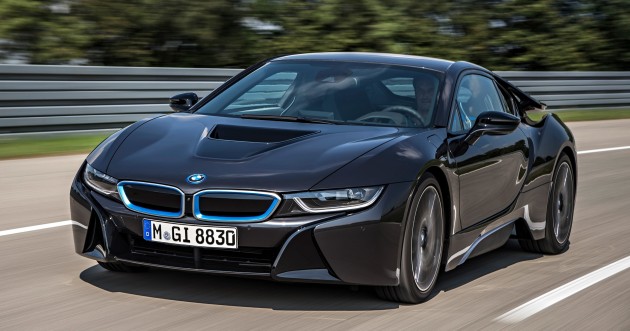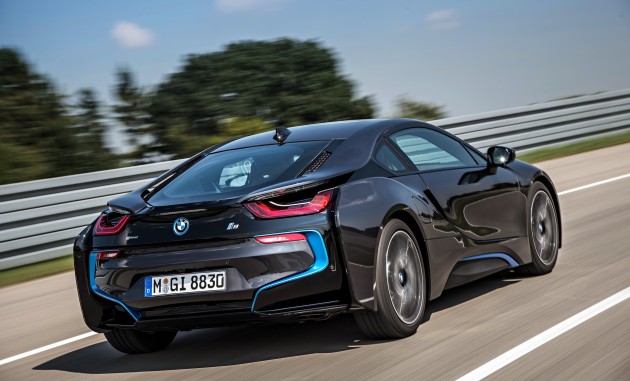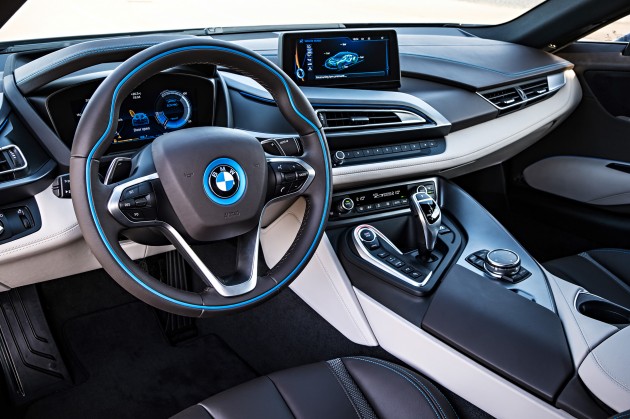Frankfurt sees the world premiere of the BMW i8 sports car – BMW Group’s first production plug-in hybrid, and the second member of the BMW i brand after the i3 city car. It’s a 2+2 coupe served in an aerodynamically groundbreaking body design, further complimented by a stylish and luxurious interior.
The emotion-led aesthetic package is based on the BMW i design language, incorporating classic sports car proportions and a fresh re-interpretation of BMW signature features. Unique layering principle gives a distinctive visual impression, with complex surface designs partnering up with clean and uncluttered lines.
It possesses much of the pizzazz and drama of the BMW Vision EfficientDynamics Concept, first shown in 2009. The futuristic model was then toned down and unveiled again as the BMW i8 concept in 2011, which leads up nicely to this, the final production form of the plug-in hybrid sports car.
Basic dimensions measure in at 4,689 mm long, 1,942 mm wide and 1,293 mm tall, encased over a long 2,800 mm wheelbase. A low drag coefficient of 0.26 is achieved by having a low-slug bonnet, partially-blanked off kidney grilles, sealed underbody, air ducts along the upper surface and slim wheels (195/50 rubber up front; 215/45 out back).
New to the BMW family are the long doors, which open upwards, similar to those on the McLaren MP4-12C. Full-LED lamps all around are fitted as standard, with the industry-first laser headlights offered as a cost option. These generate a pure-white, extremely bright light that is pleasant to the eye, at less than half the energy consumption of LED headlights.
Like the i3 city car, the i8 is made up of two integral parts, using BMW i’s LiveDrive architecture. The Life module passenger cell is made of carbon-fibre-reinforced plastic (CFRP), while the drive system, high-voltage battery, chassis, and crash structures are integrated into the aluminium Drive module.
Generous use of carbon-fibre and aluminium adds up to a low kerb weight of 1,490 kg (inclusive of the heavy battery packs and electric motors), while clever use of space and weight distribution offers a very low centre of gravity (below 460 mm to the ground) for increased dynamism.
The new plug-in hybrid system represents the latest development stage of BMW’s Efficient Dynamics programme. It debuts the company’s new 1.5 litre three-cylinder petrol engine with BMW TwinPower Turbo technology, in this application making 231 hp and 320 Nm of torque. It powers the rear wheels through a six-speed automatic gearbox.
Additionally, there’s a bespoke hybrid synchronous electric motor that sends up to 131 hp and 250 Nm of torque to the front wheels via a two-stage auto’box, offering through-the-road all-wheel drive characteristics. Powering the motor is a lithium-ion high-voltage battery with liquid cooling.
The combination of BMW TwinPower Turbo and BMW eDrive technologies produces a combined system output of 362 hp and 570 Nm of torque, allowing the BMW i8 to get from 0 to 100 km/h as quickly as 4.4 seconds, and reach an electronically limited top speed of 250 km/h.
An even bigger achievement is the claimed 2.5 litre per 100 km fuel economy and CO2 emissions of 59 grams per kilometre. Charging up the lithium-ion battery pack takes three hours with a domestic power socket, or less than 120 minutes using the BMW i Wallbox.
eDrive offers an all-electric driving range of up to 35 km, with a top speed of 120 km/h. Working in tandem with the petrol engine, a combined range of over 500 km is available. On top of that, the Driving Experience Control switch delivers five distinct driving modes.
Each of the five modes come with its own pre-set balance between dynamics and efficiency, using the powertrain controller to coordinate the cooperation between the petrol engine and the electric motor. The chosen mode alters the suspension settings and steering assistance too.
The chassis is no less sophisticated, employing a double-wishbone front suspension, rear multi-link setup, Electric Power Steering, Dynamic Damper Control and 20-inch light alloys as standard. Even lighter carbon wheels can be had as an option, which reduces unsprung weight by three kilograms at each corner.
Inside, it comes fully-equipped with the Navigation system Professional, all-digital instrument display, plus the usual BMW iDrive with a freestanding Control Display. Customers get a choice of three interior trims lines – standard Neso and optional Carpo or Halo equipment packs.

















































The post BMW i8 plug-in hybrid sports car – full official details appeared first on Paul Tan's Automotive News.
via Paul Tan's Automotive News http://paultan.org/2013/09/10/bmw-i8-plug-hybrid-sports-car-full-official-details/




No comments:
Post a Comment